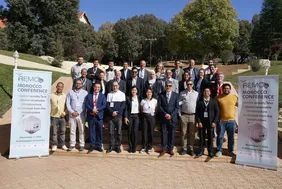How electric mobility and renewable energies should be thought of and developed together was discussed with experts during the REMO Conference on 07 November 2022 at the Moroccan partner Al Akhawayn University (AUI) in Ifrane.
With over 100 participants from Morocco, Tunisia and Germany, the hybrid conference titled “Electric Mobility and related Renewable Infrastructure: An Outlook from the Stakeholders” offered a multifaceted platform for exchange on the topics surrounding the energy and mobility transition.
The relevance of the conference theme became clear in the opening speeches of AUI President Dr Amine Bensaid and Professor Wilfried Zörner, Head of Institute of new Energy Systems (InES): "Not only technological feasibility is essential to master the mobility transition, but it also requires changing behavioural patterns in the population and awareness of the great responsibility of future generations," emphasised Dr Amine Bensaid.
Professor Wilfried Zörner supported this approach by emphasising the correlation of electric mobility and the renewable energies. After all, electric vehicles can only be a sustainable form of mobility if the electricity is clean and sustainable. In this respect he used the picture of mother and child, the mother being the renewable energies, and the child being “green” mobility.
In the morning, the one-day event focused on the political framework and national goals, which were presented by Dr Rachid El Mrabet (Director of the public utilities development company of the province of Berkane Marafik, Morocco), Mr Ernst-Benedikt Riehle (Senior Associate, International Cooperation of the German think tank Agora Verkehrswende) and Mr Abdelhamid Gannouni (Deputy Head of Energy Efficiency in Transportation, National Agency for Energy Management, Tunisia).
In the morning presentations, it became clear that political regulations are essential to make progress in achieving mobility transition respectively renewable energy goals.
Some examples, including a concept for the introduction of electric local transport in the Moroccan province of Berkane, showed the local efforts. There, an electric bus network with around 100 electric buses is to be introduced in the next few years.
In the afternoon, in addition to an established and successful automotive supplier, two young companies from Morocco and Tunisia were represented, which presented their individual challenges with regard to the mobility transition:
Dr Karl Reinhard Kolmsee, Head of Product Portfolio Management Energy Systems at the German automotive industry supplier Webasto SE, spoke in favour of interdisciplinary cooperation and reminded the audience that the German automotive industry especially must anticipate the transition to remain successful and an important pillar of German industry. It became clear that young companies in particular are taking advantage of the current mood of change and are often able to enter the market more quickly with innovative solutions.
One of these start-ups is iSmart from Morocco, the first Moroccan manufacturer of charging stations for electric vehicles. According to Dr Salima Sarikh of iSmart, however, demand for wallboxes is still very low. This is due to a lack of political framework conditions and incentive systems for the purchase of e-vehicles, as well as a deficient public infrastructure, which has so far prevented the widespread implementation of e-vehicles.
Ms Khadija Jallouli, founder and CEO of HawKar from Tunisia, presented her product, an electric vehicle that addresses the needs of people with reduced mobility. According to Ms Jallouli, HawKar thus offers demand-oriented mobility service products for people with reduced mobility, who make up around ten percent of the total population in Africa and the Middle East alone.
The intensive exchange during the conference revealed numerous new options for action and cooperation and illustrated that the close interaction between the different stakeholders from science, business and politics is crucial to successfully shape the energy and mobility transition. The conference day ended with the official unveiling of the first charging station installed at the Moroccan partner university AUI.
The conference was part of the REMO project “Renewable Energy-based E-Mobility in Higher Education”, which on the one hand aims to further develop study contents in the fields of renewable energies and e-mobility in order to train local professionals with practical expertise in Morocco and Tunisia. On the other hand, the participating universities Al Akhawayn University in Ifrane, the Tunisian University of Carthage - Ecole Nationale des Sciences et Technologies Avancées à Borj Cédria and InES at Technische Hochschule Ingolstadt, Germany, are working together with industrial partners on current research questions in the field.
The REMO project runs until the end of 2023 and is supported by DAAD with funds from the German Federal Ministry for Economic Cooperation and Development.
If you would like to receive more information about the project, please read and subscribe to our project newsletter.



![[Translate to English:] Logo Akkreditierungsrat: Systemakkreditiert](/fileadmin/_processed_/2/8/csm_AR-Siegel_Systemakkreditierung_bc4ea3377d.webp)








![[Translate to English:] Logo IHK Ausbildungsbetrieb 2023](/fileadmin/_processed_/6/0/csm_IHK_Ausbildungsbetrieb_digital_2023_6850f47537.webp)


